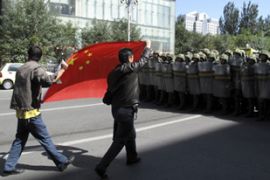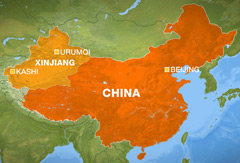Tensions high after Urumqi protest
Chinese soldiers and paramilitary police deployed amid simmering ethnic tensions.

State media, which first reported the stabbings earlier this week, said most of the victims were ethnic Han.
Local TV reports said that a total of 476 people had sought treatment for stabbings, although only 89 had obvious signs of being pricked and no deaths, infections or poisonings had occurred.
Sealed off
| Xinjiang and the Uighurs |
|
|
On Friday, in the wake of the latest protests, paramilitary police with shields, sticks and submachine guns slung over their backs sealed off People’s Square in the centre of Urumqi.
Group of armed security personnel also guarded intersections in the centre of the city, blocking access to anyone without identification showing they lived or worked there.
Thursday’s protest follows deadly riots in July between Uighurs and Han Chinese in which nearly 200 people died.
The riots were the most serious ethnic clashes seen in China in decades and prompted a massive security crackdown by Beijing.
But the latest unrest has been seen as a sign that despite that crackdown, sectarian tensions remain high in the city.
“People are angry at the government, they are scared. We are living under conditions that are not normal,” Zhou Yijun, a government office worker, told the Associated Press.
Another man, who gave his name only as Zheng, told the news agency people were very upset about the stabbings and described relations between Han Chinese and Uighurs as “very bad”.
“These people making trouble, we catch one, we kill one,” he said.
Resentment
Ethnic relations in Xinjiang have grown increasingly strained in recent years, with many Uighurs resentful at the migration of millions of Han Chinese into what they see as their homeland.
The Uighurs say the Han have unfairly benefited from the mineral wealth of Xinjiang, a strategically vital Central Asian region with significant oil and gas deposits.
Meanwhile, the Han often stereotype Uighurs as lazy, more concerned with religion than business, and unfairly favored by set-aside quotas for government jobs and university places.

 Xinjiang is officially an autonomous region but in practice it is tightly controlled by Beijing. It is sparsely populated but has large reserves of oil, gas and minerals.
Xinjiang is officially an autonomous region but in practice it is tightly controlled by Beijing. It is sparsely populated but has large reserves of oil, gas and minerals.